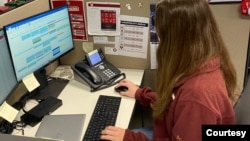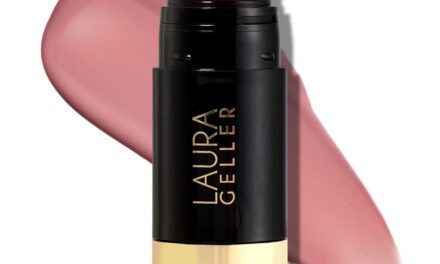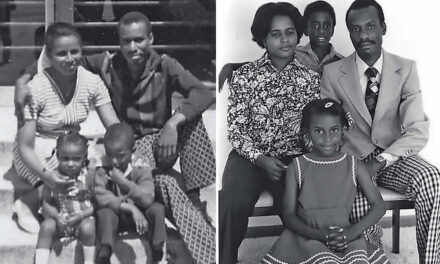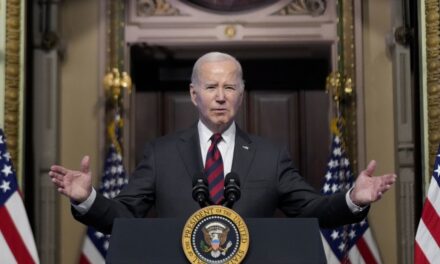Editor’s note: This story is part of a series of profiles of notable fall 2023 graduates.
Kadison Willis took the road less traveled to Arizona State University.
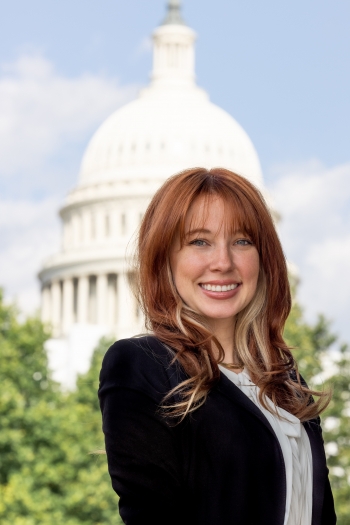
Kadison Willis took the road less traveled to ASU. Immediately after high school, the Texas native sold all of her belongings and boarded a 21-hour flight to Bangkok, several months of travel across multiple continents. But when she was struck by a debilitating mystery illness, it derailed the bachelor’s program she had started at an Australian university. She was eventually diagnosed and, with her health back under control, she was ready to finish her degree, this time with ASU Online.
Download Full Image
Immediately after high school, the Texas native sold all of her belongings and boarded a 21-hour flight to Bangkok, kicking off the adventure of a lifetime.
“Over several months, I explored Southeast Asia, Oceania, Africa and even Dubai,” she said. “Along the way, I fell in love with the east coast of Australia. I learned how to surf, which I loved, and I tried kangaroo stew, which I hated.”
When she was struck by a debilitating mystery illness, it derailed the bachelor’s program she had started at an Australian university.
After being hospitalized several times, Willis moved back to Texas in pursuit of answers. She discovered she possessed a mutated MTHFR gene, which impairs her body’s ability to filter out toxins.
By removing toxins from all aspects of her environment, Willis was able to regain her old, energetic self. Managing her lifestyle and environment also helped her discover a passion for sustainability.
With her health back under control, Willis decided she was ready to finish her degree, this time with ASU Online.
“I transferred to ASU with a major in mass communications and media studies,” she said. “After my experience with pollution and toxins, I was inspired to add a minor in sustainability. After my first class, I was hooked. I felt like my interests and experiences snapped into focus. I made the decision to turn my sustainability minor into a second degree.”
Willis continued to travel while completing her degrees. It was during the Global Intensive Experience in Belize, offered through the School of Sustainability, that she learned she’d been offered the opportunity to work as an environmental justice intern for the White House Council on Environmental Quality in Washington, D.C.
“Being in the White House opened my eyes to a world of possibilities for addressing sustainability issues,” she said. “I worked alongside some of the most intelligent and accomplished people I have ever met. I engaged in various environmental justice projects, such as background research for the Justice40 initiative and the development of the Climate and Economic Justice Screening Tool. This experience solidified my interest in working in environmental justice policy development for the federal government, a career that I hope to return to after graduate school.”
In addition to her internship in Washington, Willis found time to work for Texas state Rep. Vikki Goodwin, the National Women’s Political Caucus and the city of Austin’s Office of Sustainability.
Willis’ spirit of leadership extended to ASU’s Online Student Government where she served as director of student involvement and development and then as the elected president. Additionally, she founded the first ASU Online club for students with disabilities (Sun Devils for Accessible Education) and volunteered on the 2022 HERstory planning committee.
Currently, she is a research assistant for Mark Roseland on the Community Capital dashboard project, an interactive mapping tool that identifies environmental, social and economic indicators for communities across America.
Additionally, Willis was recently inducted into Kappa Tau Alpha, an honor society founded in 1910 to recognize academic excellence and scholarship in journalism and mass communication.
Willis is graduating with dual Bachelors of Arts in mass communications and media studies from the Walter Cronkite School of Journalism and Mass Communication and sustainability, policy and governance from the College of Global Futures’ School of Sustainability, as well as with a minor in political science.
We spoke with the new graduate to learn more about her journey with ASU Online.
Question: What’s something you learned while at ASU Online — in the classroom or otherwise — that surprised you or changed your perspective?
Answer: Growing up in the South … I was always passionate about protecting the planet, but I was raised to believe that climate change was not real. Coming to ASU and engaging with the School of Sustainability provided me with extensive data and knowledge about climate change and the effects it will have on human and animal populations, igniting in me a passion for environmental justice. Not only has this changed my perspective, but it has laid before me a career that I am excited about.
Q: Why did you choose ASU Online?
A: I chose ASU Online in the hopes that I could continue traveling, which I loved. Unfortunately, this was in 2019, so not long after, the COVID-19 pandemic hit, halting any travel plans I had.
Q: Which professor taught you the most important lesson while at ASU Online?
A: Although I’ve learned so much from my professors, the person who has taught me the most during my time at ASU is Brianne Frazier, director of student engagement and success at EdPlus. Brianne was our faculty advisor for the Online Student Government when I was serving as president. We spent countless hours on Zoom together and talked every day. She taught me so much about leadership. Getting to watch her interact with others showed me an amazing example of maintaining your strength and authority as a woman in leadership while also approaching situations with grace and kindness.
Q: What was your favorite or most meaningful course, and why?
A: My favorite course was MCO 460: Race, Gender and Media with Dr. Bramlett-Solomon (lovingly known as Dr. SBS). She is one of the most endearing and intelligent professors I’ve had the pleasure of learning from. In this course, she provided a compelling timeline of the experience of women and people of color in America, enlightening me with information I should have known long ago.
Q: What’s the best piece of advice you’d give to those still in school?
A: Take your time. If I had graduated college four years after high school, I wouldn’t have had the time to discover my love for sustainability and inevitably get a degree that I am incredibly passionate about. Our world is designed with the expectation that you will know your whole life plan by the age of 18, and truthfully, that is just not always the case. Don’t be afraid to take a deep breath, slow down and explore the things that interest you. Finishing college with something you are excited about is more valuable than how long it takes you.
Q: What was your favorite spot for power studying?
A: I love studying at Community Garden in Austin, Texas. It is a new local spot that opened on the “east side,” which is Austin’s eclectic, up-and-coming district. They make the best smiley-face acai bowls, which I am a big fan of. I like to go there for breakfast, cozy up on their big green velvet couch and study. The atmosphere feels very midcentury modern with plants everywhere and records playing in the back. It’s the perfect balance between quiet and stimulating.
Q: What are your plans after graduation?
A: I am applying to graduate school to study the intersection of politics, environment and society, either at the University of Oxford or the University of Edinburgh. After graduate school, I intend to return to broad-scale policy development and implementation for environmental justice efforts either at the White House Council on Environmental Quality or the United Nations.
Q: If someone gave you $40 million to solve one problem on our planet, what would you tackle?
A: I really believe that educating and uplifting women can solve most of the world’s problems. So, if I were given $40 million, I would put it towards educating women across the globe. The United Nations acknowledges the importance of this in their Sustainable Development Goals.
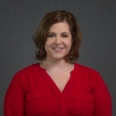
College of Integrative Sciences and Arts notable grad Margaret Huck’s research is supporting conservation of sensitive amphibian species as part of USDA project
Editor’s note: This story is part of a series of profiles of notable fall 2023 graduates.
Aspiring ecologist Margaret Huck’s research is contributing directly to protect Arizona rivers and wildlife as part of efforts led by the U.S. Department of Agriculture Forest Service. In particular, her research is helping to inform the government agency’s water management decisions for the Verde River, a key tributary of the Colorado River.
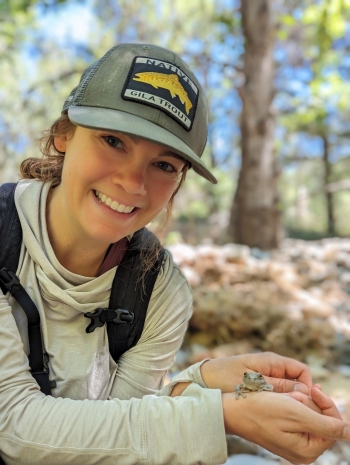
Margaret Huck is graduating with a master’s degree in applied biological sciences from the College of Integrative Sciences and Arts at ASU. She earned the Science and Mathematics Outstanding Graduate Student Award, presented at CISA’s spring 2023 Student Showcase. Photo courtesy of Margaret Huck
Download Full Image
Huck, who is graduating with a master’s degree in applied biological sciences in the School of Applied Sciences and Arts in the College of Integrative Sciences and Arts at Arizona State University, is focusing on amphibian breeding as it relates to streamflow, habitat structure and sustaining biodiversity. She says climate-change-induced water flow reductions and human water development are threatening these riparian ecosystems, even in protected wilderness areas.
Huck co-authored an article about her research, which is under peer review with the high-impact journal Ecology.
She conducted her research in the Bateman Lab led by her faculty advisor Heather Bateman, a professor in CISA’s School of Applied Sciences and Arts at ASU’s Polytechnic campus. Huck said Professor Bateman inspired her decision to attend ASU and has “taught me so much about how to be a better scientist, writer and naturalist — and how to fail, pivot and problem-solve.”
Bateman said that Huck rose to every challenge required for the complex project in the Verde River basin.
“Maggie coordinated across researchers who study amphibians, birds and vegetation to install instruments in remote wilderness areas to collect high-quality data,” Bateman said. “She’s also trained an undergraduate colleague to safely collect field data in backcountry areas. She’s communicated her research results to both experts in the field and to non-scientists.”
In addition to working on this ambitious research, Huck helped refurbish the desert arboretum at ASU’s Polytechnic campus with a grant from ASU’s Sustainability Initiatives Revolving Fund.
“What started as an idea in Dr. Cindy Sagers’ Vegetation Dynamics class turned into a grant proposal and eventually $5,000 in funding to refurbish the arboretum and establish a long-term carbon sequestration study there,” Huck said. “Since then, we’ve partnered with Boyce Thompson Arboretum, which graciously donated trees, shrubs and cacti for us to plant. We’ve involved hundreds of undergraduates in soil sampling and processing, and a handful of enthusiastic students have joined the project and are running with it.”
Her dedication to these research projects earned Huck the Science and Mathematics Outstanding Graduate Student Award presented at CISA’s spring 2023 Student Showcase.
Following graduation, Huck says she wants to be a biological scientist for a federal or state agency and “conduct science that is contributing to solving a specific issue and will have tangible effects.”
Question: What was your “aha” moment when you realized you wanted to study the field you majored in?
Answer: I realized I wanted to be an ecologist when I took Terrestrial Field Ecology as an undergraduate. Most of my classes had been micro- or molecular biology focused up until that point, and I was a junior taking this class when I finally realized that ecology and wildlife biology were career pathways. Getting out into the field during that class solidified my love for fieldwork, and it’s why I’m now passionate about exposing students to fieldwork early on in their undergraduate careers.
Q: What’s something you learned while at ASU — in the classroom, lab or otherwise — that surprised you or changed your perspective?
A: In Dr. Bateman’s Applied Herpetology class, we had the opportunity to get out in the field: doing nighttime road-cruising to look for wildlife, checking out Phoenix-Mesa Gateway Airport lizard traps, and taking a two-night field trip to Peña Blanca Lake with the Arizona Game and Fish Department. These field trips were the first time many students had closely encountered herpetofaunareptiles or amphibians of a particular region or habitat in the wild — the first time they had held a frog or been near a rattlesnake. I took for granted having regular interactions with wildlife through my research and different outdoor recreational activities and assumed most people living in the desert would have had some experience with herpetofauna in the wild, but my perspective on human-wildlife interactions in the Sonoran Desert has changed. I can now imagine how many people live in the Phoenix Valley all their lives and never see a snake or a frog or toad. It shouldn’t be an experience reserved for wildlife biologists, but getting students out in the field is an important step towards bridging that gap.
Q: Why did you choose ASU?
A: For my graduate studies, I had hoped to land at a large university with broader ecological class offerings compared to my undergraduate institution. ASU offered the courses and resources I was looking for, but my choice ultimately came down to the advisor and the project. My research interests aligned closely with Dr. Heather Bateman’s, and I knew from speaking to her lab members that she mentors her students with patience and care. Most importantly, I was drawn to the applied nature of my project.
Q: What’s the best piece of advice you’d give to those still in school?
A: Build a community inside and outside of ASU, and do not be afraid to ask for help. Connect with your lab mates, classmates and professors, and show up for your friends and colleagues when they’re struggling. Success in grad school would not have been possible without the village of people that was there for me to lean on.
Q: What was your favorite spot on campus, whether for studying, meeting friends or just thinking about life?
A: I love the Polytechnic campus for its peaceful and secluded outdoor seating areas and naturalized landscaping. My favorite spot to sit is under the mesquite trees on the lawn behind the Applied Arts Pavilion.


